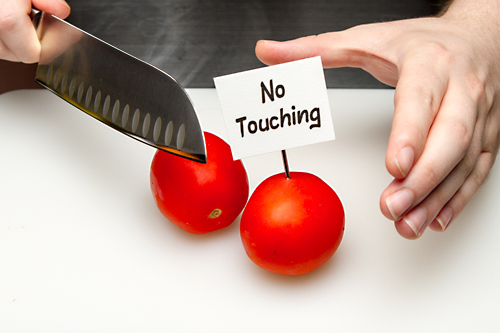Ask Tim Kellen, Aramark Corporation’s food service director at Portland State, about non-latex glove use in his kitchens, and he’ll tell you how it impacts his bottom line.
Food safety and the gloved hand
Ask Tim Kellen, Aramark Corporation’s food service director at Portland State, about non-latex glove use in his kitchens, and he’ll tell you how it impacts his bottom line.
Kellen’s team goes through approximately 183,000 gloves a year, and between July 1, 2011, and June 30, 2012, spent $8,913 on gloves alone.

“That’s a lot of gloves,” Kellen said. “It’s a big chunk of our money, but it’s worth it to be safe. In our eyes, that’s a cost that we gladly have…The safety feature outweighs what it costs to have those gloves on hand.”
As of July 1, a new rule banning barehanded contact with ready-to-eat food in restaurants was set to sweep through Oregon’s many commercial kitchens. However, in the wake of vocal protest from the food service industry and debate over the effectiveness of the rule, its implementation has been held off for 60 days of extended public review.
The new rule would require gloved-hand contact with ready-to-eat food and that the food be handled only with single-use, non-latex gloves, tongs, tissues or some other kind of utensil. Gloves would be disposed of after being soiled or before starting new food preparation.
The law won’t create much change for Kellen’s employees, but at smaller restaurants on campus and off, the switch will require training employees and a steep uptick in the use and cost of the disposable gloves.
PSU’s food service company, ARAMARK, adopted the rule when the Food and Drug Administration issued it in 2009. Working in multiple states, in hundreds of institutions, ARAMARK follows the federal rule in all their locations, Kellen said.
At PSU, food service workers have a box of gloves at each station for ready access and are encouraged to change gloves after before starting a new task to ensure no cross contamination occurs, he explained.
However, some studies, such as one published by the International Association for Food Protection in 2006 on the improvement of hand washing practices in the food industry, showed that when gloves were in use, hand washing amongst food service employees was less frequent than when using bare hands to handle food. According to the study, the problem that arises is that glove wearing can lead to negligence in hand washing. At times, food services workers wearing gloves may feel that it is not necessary to wash their hands as often, claiming that non-glove-wearing workers scored better on hand washing frequency and proficiency than in cases where gloves were worn.
“You can feel when your hands are dirty, like when you have egg on your fingers, it dries and sticks and it’s something you want to get off. If you are doing the same operation with gloves, the egg is still going to be on the gloves and spreadable, unless the gloves are changed every time you start something new, but that’s ridiculously wasteful,” said Joseph Magill, an economics and social science double major who works at PSU’s student-run Food For Thought Café.
Under the new rule, Food For Thought Café would be required to ban barehanded prep of food that won’t require cooking before serving. Though students use gloves when preparing large quantities of food or mixing items like salads by hand, the variety of tasks that would require gloves under the new rule would expand dramatically. With meals like sandwiches and wraps, extra glove use would be unavoidable, since they cannot be prepared with tongs or forks.
“Our biggest concern would be the additional waste involved, since we buy heavy weight latex gloves that last a while. We would go through a lot more of those than we do, we use a very minimal amount of them. Also I would personally be concerned about the cleanliness of the gloves, if people weren’t interested in changing them per order,” Magill added.
According to Magill, many of the students who work at Food For Thought already have extensive experience in the food service industry, and good hand washing habits are engrained over time. The kitchen staff practice strict hand washing before and after any breaks, after touching non-kitchen surfaces and before prepping a new item.
Though PSU food services uses gloves for all stages of food prep, the prescribed hand washing practices are as if it were a bare-hand kitchen, according to Kellen. Staff are required to wash their hands every time they leave their work station and every time they change gloves between jobs.
“Does it happen all day every day? No. Some people think—especially young students that are new to the food service world—that just because they have gloves on they don’t have to wash their hands, but we are always striving to help them remember,” Kellen said.
In spite of the hundreds of thousands of disposable gloves that are used already and the potential increase from kitchens around campus like Food For Thought and Rogue Hall, the waste created by disposable gloves would constitute an insignificant percentage of PSU’s current daily waste output, according to PSU Director of Community Environmental Services Eric Crum.
“The amount of food waste being diverted for composting proportionally would far outweigh the potential disposal of the gloves,” Crum explained in an e-mail to the Vanguard.
For Kellen, that’s not the most important issue.
“I don’t think you can put a sustainability standard on safety,” he said. “We wear the gloves as a 100 percent safety, not just to make people wear gloves.”





